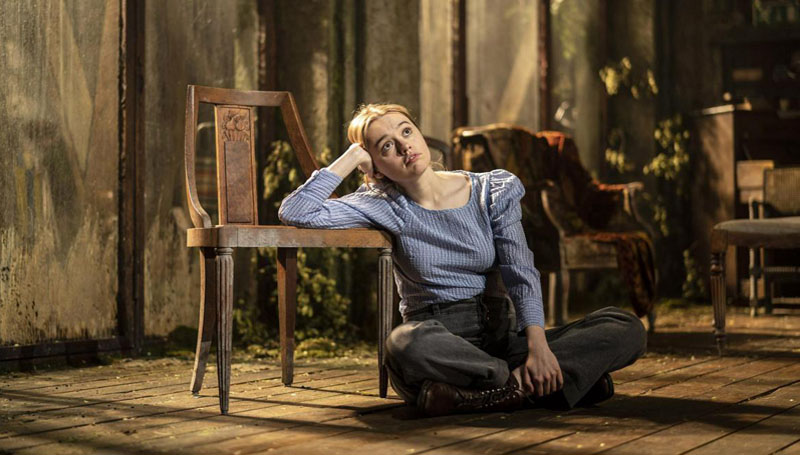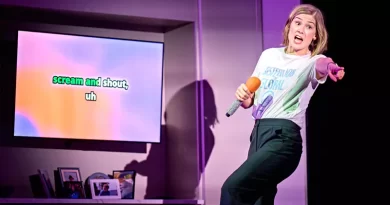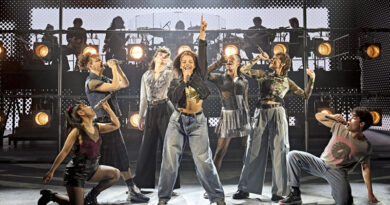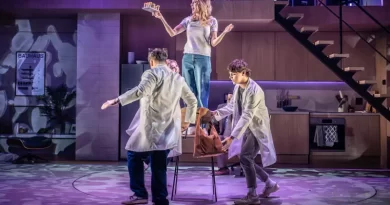“Uncle Vanya”: The Harold Pinter Theatre
Jeremy Malies in the West End
1st March 2020
It may be a signature throughout Anton Chekhov that his characters should be starved of love, but I’ve rarely seen them more emotionally thwarted than in this Uncle Vanya, or the Almeida Theatre’s recent Three Sisters. Conor McPherson’s new version of Vanya is a pure form of Chekhov with nothing — even Astrov’s concern about climate change — being without evidence from the text. Director Ian Rickson focuses on essentials by detaching the piece from any recognizable period and McPherson excises a few cultural references. You sense that adaptor and director are placing the lightest hand on the tiller, confident that with one of the finest actors of our generation in the lead, the piece will acquire natural momentum.
l also saw hints that Rickson may have encouraged the principals to work in a devised collaborative manner during rehearsal. Allowing the cast to use their resting accents (a contemporary trend) frees up the atmosphere and context. But there is great respect for text; regietheater this is not. Rickson adopts a pace that, while not quite stultifying, reminds us that little is happening. This became a problem in that on a few occasions on press night the audience (short of incident) imagined gags when there simply were none. Unwanted laughs must have thrown the cast off-kilter. That’s not to say that there isn’t any humour but it’s often sardonic:” Only people in books go out and teach people to read and feed the sick peasants.”
“They always cast Sonya as too glamorous” was a comment l heard in the interval. Aimee Lou Wood (a recent RADA product currently starring in the Netflix comedy series Sex Education) is certainly luminous. She excels in one of the play’s last hallmark speeches about the need for stoicism. Toby Jones is predictably outstanding in the title role; his generally bumbling Vanya can switch quickly to a deep vein of irony accompanied by snarls, and he is at no time taken in by the academic posturing of Serebryakov (Ciaran Hinds). Precise blocking of his attempt to shoot the professor leaves matters delicately balanced between the purely comic and quasi-serious. This is a tougher more self-aware Vanya than the norm, but his unrequited passion for Yelena is as pitiful as ever. When Jones wants to work purely for slapstick, as in the scene in which he cavorts with Astrov and Waffles, we realize the spectrum of his gifts. His descent into alcoholism is nuanced and he seeks to justify it when he explains that vodka has allowed him to kill the days for twenty-five years during which he has resembled a rat running around a pipe.

Toby Jones, Aimee Lou Wood and Rosalind Eleazar.
Photo credit: Johan Persson.
lt may be powerful and authentic but the production certainly doesn’t excel across the board, and neither Rosalind Eleazar (Yelena) or Richard Armitage (Astrov) impressed me, with the pair giving little indication of sexual chemistry. The famous scene in which Astrov describes deforestation fails to ignite, and the maps (laid on the floor) were barely visible to anybody in the stalls. (My pal who was standing at the back of the gods said he could see them perfectly which is at least ochlocratic.) I’ve known productions in which Yelena seems bored by the lecture, but I’ve always believed in her attraction to Astrov. Earlier, Armitage has achieved little audience traction or intensity with his big speech (a popular monologue for students) in which he recalls failing to save an injured railwayman on the operating table. lt should be a gift for any actor.
In addition to Jones, the production’s star is lighting designer Bruno Poet who is at times painterly while creating the illusion that whole scenes are being illuminated by candles. He builds atmospheres that are alternatively arid then muggy, dusty, and then cleansed. Just as Astrov and Vanya are poisoning themselves with vodka, we see that the russet colours of the forest backdrop are the result of the foliage losing its source of vitality. Many of the characters are at a similar autumnal stage in their lives. But towards the close, Poet’s extraordinary use of filters suggests that a cleansing rain will soon enliven the forest again — so dovetailing with Sonya’s cautious optimism.
Rae Smith’s design is more than a set and has the status of an installation or symbolic space with the threatened trees of the Voynitsky estate thrusting limbs through the decrepit windows. There are plenty of props suggesting that the house is really lived in, but Smith skilfully avoids any reference to period and you’ll look in vain for a samovar. A few artifacts hint that the religious background is traditional Russian Orthodox and that is as specific as we get. This is an inconsistent but frequently brilliant evening that can be grueling and takes its tone from the newly-wed stranger. Yelena knows that she is a footnote at the end of her husband’s life. And as McPherson has Yelena say in his version, “There are no happy endings in footnotes”.

Richard Armitage and Peter Wight.
Photo credit: Johan Persson.









